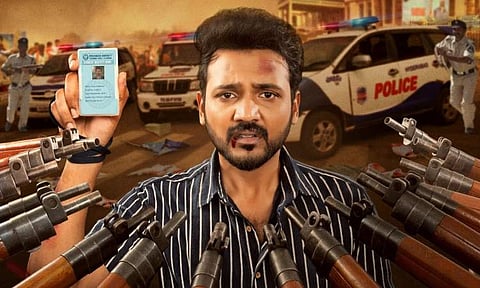Nenu Student Sir Movie Review: A half-hearted, hodgepodge film
Rating:(2 / 5)
Much like Goutham Tinnanuri’s Jersey, the story of Nenu Student Sir (differences notwithstanding) is bookended by the pursuit and the eventual possession of a certain object. If it is the prized Indian cricket team jersey in the former, in the latter, it is an iPhone. Not just any iPhone, but a black iPhone, 64 GB, 12 series, 89, 999 rupees. These four details, parroted in this very order, are heard in multiple dialogues throughout the film — presumably to make the penny-stretching, middle-class origins of the film’s protagonist Subba Rao alias Subbu (Ganesh Bellamkonda), loud and clear. Subbu, in the first few minutes of the film, is shown doing all kinds of odd jobs for months to rake up the money he needs to buy the iPhone. He refuses money from his parents, saying, “The phone is not a need but a want, so I want to buy it myself.” The want and need of the film at large are never quite clear, for it is content with providing information when it should have really opted the path of persuasion.
Cast - Ganesh Bellamkonda, Avantika Dassani, Samuthirakani, Sunil, Srikanth Iyengar
Director - Rakhi Uppalapati
The persuasion could have come in handy, when Subbu, a grown adult male, names his phone Bujji and calls it his younger brother. Or when Sruthi (Avantika Dassani), who falls in love with Subbu, does not get angry when she learns that Subbu wanted her to retrieve his lost iPhone that her father (Samuthirakani, a police commissioner) is somehow responsible for. Or when we are expected to understand that Samuthirakani’s and Avantika’s characters are Tamilians because they shift gears from Telugu twice in the film and drop words like appa and Muruga. With the notable exception of Maa Vintha Gaadha Vinuma, no Telugu film, to the best of my memory, has quite gotten the depiction of Hyderabad-based Tamilians right. The haphazardness involved in assigning two characters a specific ethnicity is only emblematic of the rest of the film’s storytelling (or lack thereof).
There are two warring student groups in the university he attends, and he continuously gets scapegoated by either. How does Subbu — who cannot even defend himself when he gets choked by a kanduva — manage to escape a hit job by handcuffing a cop to a jeep and fleeing? If Subbu is painfully naive in the first half, he has the smarts to unearth a financial scam in the second. The math does not quite add up, even in a kind of cinema where even the expectation of logic is laughably futile.
Ganesh Bellamkonda, much like his debut film Swathi Muthyam, plays a gullible simpleton whose emotions are as plain and elementary as the three primary colours. Given that we live in an era where filmmakers are obsessed with multiverses and the cinematic universe(s), the performances of Ganesh in his two films so far are so similar, the characters might just be the same person in two different realities. While reverse engineering a story to fit an actor’s real-life personality, or rather, their arsenal of expressions, is a common practice, the writers can only do so much when the actor’s persona has little to write home about.
Even though the inclusion of actors with privilege and backing is the reason why certain films are greenlit in the first place, they could also be the film’s biggest undoing. For all its narrative limitations, Nenu Student Sir might have just been a more watchable film had it featured someone more competent and charismatic. The same could be said of the film’s angelic (but equally expressionless) female lead, Avantika Dassani, though she will never be implicated in a film’s failure as a male lead would, as their roles have the same importance and value as a lampshade in a room would.
Nenu Student Sir attempts to arch around but buzzes around in circles, with little sense of completeness and due fulfillment.

